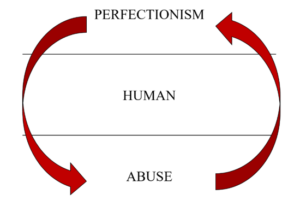 PERFECTIONISM…. We have all heard this term. Some view it as a gift; others view it as a curse. What is perfectionism…is it good, bad, helpful, or deceitful? Society preaches a performance-based acceptance. For many, the very foundation of their self-worth is based on how well they are able to complete or perform a task. Perfectionism is believed to create strong confidence in one’s self; the more you can accomplish with perfection the greater your belief in your abilities. Perfectionism is thought to be a healthy competitive mindset; because I aim to be perfect I am highly competitive rising above the competition. Perfectionism is sometimes even a cultural or familial standard.
PERFECTIONISM…. We have all heard this term. Some view it as a gift; others view it as a curse. What is perfectionism…is it good, bad, helpful, or deceitful? Society preaches a performance-based acceptance. For many, the very foundation of their self-worth is based on how well they are able to complete or perform a task. Perfectionism is believed to create strong confidence in one’s self; the more you can accomplish with perfection the greater your belief in your abilities. Perfectionism is thought to be a healthy competitive mindset; because I aim to be perfect I am highly competitive rising above the competition. Perfectionism is sometimes even a cultural or familial standard.I don’t have a great transition, so let me just be blunt here, because that’s what I do best: Perfection is an impossible standard. By default, all humans are flawed and therefore cannot be perfect. If perfection is achieved there are more goals to be set, thus raising the bar higher on the expectations you set for yourself, and then the perfectionism cycle is triggered.
Let me explain the perfectionism cycle! Perfectionism is an expectation that you are attempting to accomplish. This can be an overarching lifestyle of perfectionism, it can be academic, career, or athletics based… the areas where perfectionism is applied are unlimited. Perfectionism is a standard of performance you expect yourself to achieve. Notice in this cycle it bypasses “human” and goes straight to “abuse.”
For a minute, before you read any further, I want you to think about abuse…physical, emotional, and verbal…If someone were to treat you abusively what would that be like?
In perfectionism, when you fail to meet your perfect expectation you begin to apply this same abuse to yourself. For some this is verbal abuse “you idiot…” For some it may be physical abuse such as slapping oneself, starvation, cutting, etc. For all it is emotional abuse as the root of the self-abuse is deep self-shaming. From here abuse creates new standards of perfection, new goals in an effort to achieve the unmet perfection, and the cycle starts over… only this time there is a twist… the abuse has now created a fear of failure because you do not want to feel the shame of abuse so you try extra hard to be perfect only to fall further into abuse with each failed expectation. This cycle is lethal. It drains confidence, it destroys self-worth, it kills joys, it robs you of life in the moment, it is a cause of major depression, hopelessness, and even suicide.
This cycle is the death trap.
*The antidote to the perfection-abuse cycle is grace. Grace is the acceptance of being imperfect. Christ says he came to save the sinner, not the righteous! This is grace! This is Being Human! But he said to me, “My grace is sufficient for you, for my power is made perfect in weakness. Therefore I will boast all the more gladly of my weaknesses, so that the power of Christ may rest upon me” 2 Corinthians 12:9. To the perfectionist, performing less than perfect is a difficult pill to swallow. Imperfection is heavy and creates a sense that one has been defeated or that they have sinned or fallen short. This is part of the abuse process. If we can give ourselves permission to be human and live in grace, Romans 6:14 tell us grace will have dominion over sin.
You were not created to be perfect. Perfection was never part of God’s vision, otherwise he would not have sent Christ to be your savior from imperfection. Scripture is clear that Christ is the only human to ever accomplish a perfect existence and that there will never be another like him. It is not through perfection or performance that our self-worth is created, but though grace and living human that builds a strong self-worth.
Grace is the antidote to the perfection-abuse cycle.
Grace is permission to be authentically YOU!
“Grace” by Tenth Avenue North
